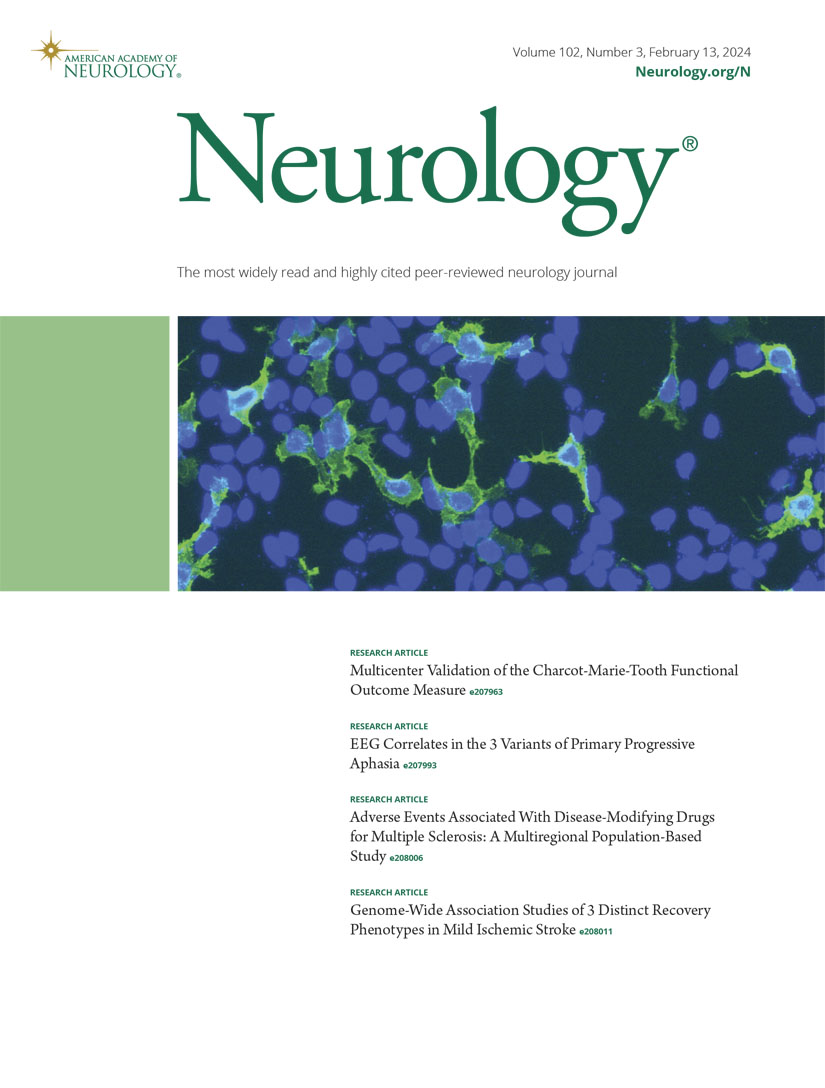美国成年人长期摄入红肉与痴呆风险和认知功能的关系
IF 8.5
1区 医学
Q1 CLINICAL NEUROLOGY
引用次数: 0
摘要
背景和目的以往的研究显示,红肉摄入量与认知健康之间的关系并不一致。在这项前瞻性队列研究中,我们纳入了来自美国两项全国性队列研究(护士健康研究(NHS)和卫生专业人员随访研究(HPFS))的基线无痴呆症的参与者。饮食采用经过验证的半定量食物频率问卷进行评估。我们从 NHS 参与者(1980-2023 年)和 HPFS 参与者(1986-2023 年)中确定了痴呆症病例。我们使用认知状况电话访谈(1995-2008 年)对 NHS 参与者中的一部分人进行了客观认知功能评估。主观认知能力下降(SCD)由 NHS 参与者(2012 年、2014 年)和 HPFS 参与者(2012 年、2016 年)自我报告。结果痴呆分析包括133771名参与者(65.4%为女性),平均基线年龄为48.9岁;客观认知功能分析包括17458名女性参与者,平均基线年龄为74.3岁;SCD分析包括43966名参与者(77.1%为女性),平均基线年龄为77.9岁。与每天摄入<0.10份加工红肉相比,每天摄入加工红肉≥0.25份的参与者患痴呆症的风险高13%(危险比[HR]1.13;95% CI 1.08-1.19;线性相关性<0.001),患SCD的风险高14%(相对风险[RR]1.14;95% CI 1.04-1.25;线性相关性=0.004)。较高的加工红肉摄入量与全球认知能力(每增加 1 份/天,增加 1.61 年[95% CI 0.20-3.03])和语言记忆能力(每增加 1 份/天,增加 1.69 年[95% CI 0.13-3.25],两者的线性相关性均为 0.03)的加速衰老有关。与每天摄入小于 0.50 份未经加工的红肉相比,每天摄入≥1.00 份未经加工的红肉的 SCD 风险高出 16%(RR 1.16;95% CI 1.03-1.30;多重性 = 0.04)。用每天 1 份坚果和豆类代替加工红肉与痴呆风险降低 19% (HR 0.81,95% CI 0.75-0.86)、认知老化年数减少 1.37 年(95% CI -2.49--0.25)和 SCD 风险降低 21% 有关(RR 0.79,95% CI 0.68-0.92)。可将减少红肉摄入量纳入膳食指南,以促进认知健康。还需要进一步的研究来评估这些发现在不同种族背景人群中的普遍性。本文章由计算机程序翻译,如有差异,请以英文原文为准。
Long-Term Intake of Red Meat in Relation to Dementia Risk and Cognitive Function in US Adults.
BACKGROUND AND OBJECTIVES
Previous studies have shown inconsistent associations between red meat intake and cognitive health. Our objective was to examine the association between red meat intake and multiple cognitive outcomes.
METHODS
In this prospective cohort study, we included participants free of dementia at baseline from 2 nationwide cohort studies in the United States: the Nurses' Health Study (NHS) and the Health Professionals Follow-Up Study (HPFS). Diets were assessed using a validated semiquantitative food frequency questionnaire. We ascertained incident dementia cases from both NHS participants (1980-2023) and HPFS participants (1986-2023). Objective cognitive function was assessed using the Telephone Interview for Cognitive Status (1995-2008) among a subset of NHS participants. Subjective cognitive decline (SCD) was self-reported by NHS participants (2012, 2014) and HPFS participants (2012, 2016). Cox proportional hazards models, general linear regression, and Poisson regression models were applied to assess the associations between red meat intake and different cognitive outcomes.
RESULTS
The dementia analysis included 133,771 participants (65.4% female) with a mean baseline age of 48.9 years, the objective cognitive function analysis included 17,458 female participants with a mean baseline age of 74.3 years, and SCD analysis included 43,966 participants (77.1% female) with a mean baseline age of 77.9 years. Participants with processed red meat intake ≥0.25 serving per day, compared with <0.10 serving per day, had a 13% higher risk of dementia (hazard ratio [HR] 1.13; 95% CI 1.08-1.19; plinearity < 0.001) and a 14% higher risk of SCD (relative risk [RR] 1.14; 95% CI 1.04-1.25; plinearity = 0.004). Higher processed red meat intake was associated with accelerated aging in global cognition (1.61 years per 1 serving per day increment [95% CI 0.20-3.03]) and in verbal memory (1.69 years per 1 serving per day increment [95% CI 0.13-3.25], both plinearity = 0.03). Unprocessed red meat intake of ≥1.00 serving per day, compared with <0.50 serving per day, was associated with a 16% higher risk of SCD (RR 1.16; 95% CI 1.03-1.30; plinearity = 0.04). Replacing 1 serving per day of nuts and legumes for processed red meat was associated with a 19% lower risk of dementia (HR 0.81, 95% CI 0.75-0.86), 1.37 fewer years of cognitive aging (95% CI -2.49 to -0.25), and a 21% lower risk of SCD (RR 0.79, 95% CI 0.68-0.92).
DISCUSSION
Higher intake of red meat, particularly processed red meat, was associated with a higher risk of developing dementia and worse cognition. Reducing red meat consumption could be included in dietary guidelines to promote cognitive health. Further research is needed to assess the generalizability of these findings to populations with diverse ethnic backgrounds.
求助全文
通过发布文献求助,成功后即可免费获取论文全文。
去求助
来源期刊

Neurology
医学-临床神经学
CiteScore
12.20
自引率
4.00%
发文量
1973
审稿时长
2-3 weeks
期刊介绍:
Neurology, the official journal of the American Academy of Neurology, aspires to be the premier peer-reviewed journal for clinical neurology research. Its mission is to publish exceptional peer-reviewed original research articles, editorials, and reviews to improve patient care, education, clinical research, and professionalism in neurology.
As the leading clinical neurology journal worldwide, Neurology targets physicians specializing in nervous system diseases and conditions. It aims to advance the field by presenting new basic and clinical research that influences neurological practice. The journal is a leading source of cutting-edge, peer-reviewed information for the neurology community worldwide. Editorial content includes Research, Clinical/Scientific Notes, Views, Historical Neurology, NeuroImages, Humanities, Letters, and position papers from the American Academy of Neurology. The online version is considered the definitive version, encompassing all available content.
Neurology is indexed in prestigious databases such as MEDLINE/PubMed, Embase, Scopus, Biological Abstracts®, PsycINFO®, Current Contents®, Web of Science®, CrossRef, and Google Scholar.
 求助内容:
求助内容: 应助结果提醒方式:
应助结果提醒方式:


